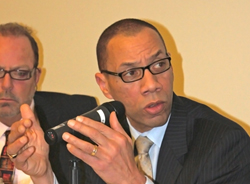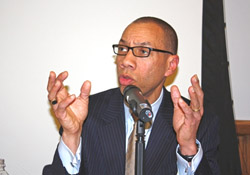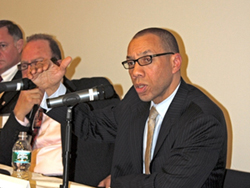Filed Under > NYC Schools
Extolling the Virtues of Mayoral Control of NYC Schools
Dennis M. Walcott, Deputy Mayor for Education and Community Development, tells principals and alumni of TC's Cahn Fellows program that New York City public schools are much better off under mayoral control than they were in the old local school district system.
Although there is much work ahead for the Department of Education to meet its two major goals of raising standards and strengthening accountability, Walcott said the department was doing a much better job since the state Legislature combined 32 autonomous school districts into one citywide system controlled by Mayor Michael Bloomberg.
“I just can’t stress too much the issue of mayoral control,” Walcott said. “If we go back to the old system, we will undermine all the good that’s been done, and have the potential of risking the future of our children.”
The 2002 state law that established mayoral control is set to expire this year, and Bloomberg, Walcott and Chancellor Joel Klein have been publicly advocating for its renewal. A vote is expected in June.
During seven years of mayoral control, Walcott said, high school graduation rates and test scores have risen, the achievement gap between white and minority students has narrowed, and participation in advanced placement courses, as well as scores on A.P. tests, are higher as well. The numbers of charter schools and curriculum options for students have also risen.
Walcott addressed about 50 current and past participants in the Cahn Fellows program at Teachers College, an intensive leadership development program for New York City
A panel of four principals responded to Walcott’s remarks and asked a few questions. Christina Tettonis, principal at the Hellenic Classical Charter School in Brooklyn , asked if the mayor’s office will continue to support small schools. “Yes,” Walcott quickly answered, even though he noted that start-up costs are high for small schools. “I’m a big believer—and the mayor and chancellor are big believers—in having options for students,” including small specialized and charter schools.”
New York City’s and the nation’s economic recession will hit hard, however. Barbara Freeman, principal of
Panelist Jeffrey Scherr, an educational consultant and former principal of Francis Lewis High School in Queens , got a reaction when he suggested that principals aren’t getting enough support from the central office under the new system. “People need feedback,” Scherr said, not just in the form of test scores, but “about the tone of each building, the overall progress” of each school. “My concern is that the lack of supervision leads to the possibility of failure before the test scores come in.”
But to some in the audience, “support from the central office” meant too much control by the Department of Education. “When they stopped telling me how to do bulletin boards,” said one principal who wished not to be identified, “my [students’] scores went up.”
Dusty Miller, a member of the audience and principal at the New York City Museum School
Walcott said the chancellor’s office was taking steps to improve dialogue with principals, and the conversations needed to be about “system-wide standards and accountability.” And responding to a question about over-emphasis on testing, Walcott said he believes that “testing in the right way—preparing kids to be tested in the right way—is the greatest thing in the world. We are a test-driven society. We are tested every day. I am being tested right here tonight. I think delivering content and then testing on that content is a good thing. It’s about holding the system accountable.”
Published Monday, Feb. 16, 2009



